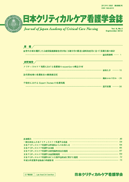Volume 1, Issue 3
Displaying 1-8 of 8 articles from this issue
- |<
- <
- 1
- >
- >|
-
2005Volume 1Issue 3 Pages 1-6
Published: September 30, 2005
Released on J-STAGE: July 02, 2015
Download PDF (599K)
-
2005Volume 1Issue 3 Pages 14-15
Published: September 30, 2005
Released on J-STAGE: July 02, 2015
Download PDF (531K) -
2005Volume 1Issue 3 Pages 16-20
Published: September 30, 2005
Released on J-STAGE: July 02, 2015
Download PDF (649K)
-
2006Volume 1Issue 3 Pages 25-34
Published: 2006
Released on J-STAGE: May 19, 2015
Download PDF (456K) -
2006Volume 1Issue 3 Pages 35-45
Published: 2006
Released on J-STAGE: May 19, 2015
Download PDF (422K)
-
2006Volume 1Issue 3 Pages 46-59
Published: 2006
Released on J-STAGE: May 19, 2015
Download PDF (490K) -
2006Volume 1Issue 3 Pages 60-70
Published: 2006
Released on J-STAGE: May 19, 2015
Download PDF (553K)
-
2006Volume 1Issue 3 Pages 71-74
Published: 2006
Released on J-STAGE: May 19, 2015
Download PDF (264K)
- |<
- <
- 1
- >
- >|
